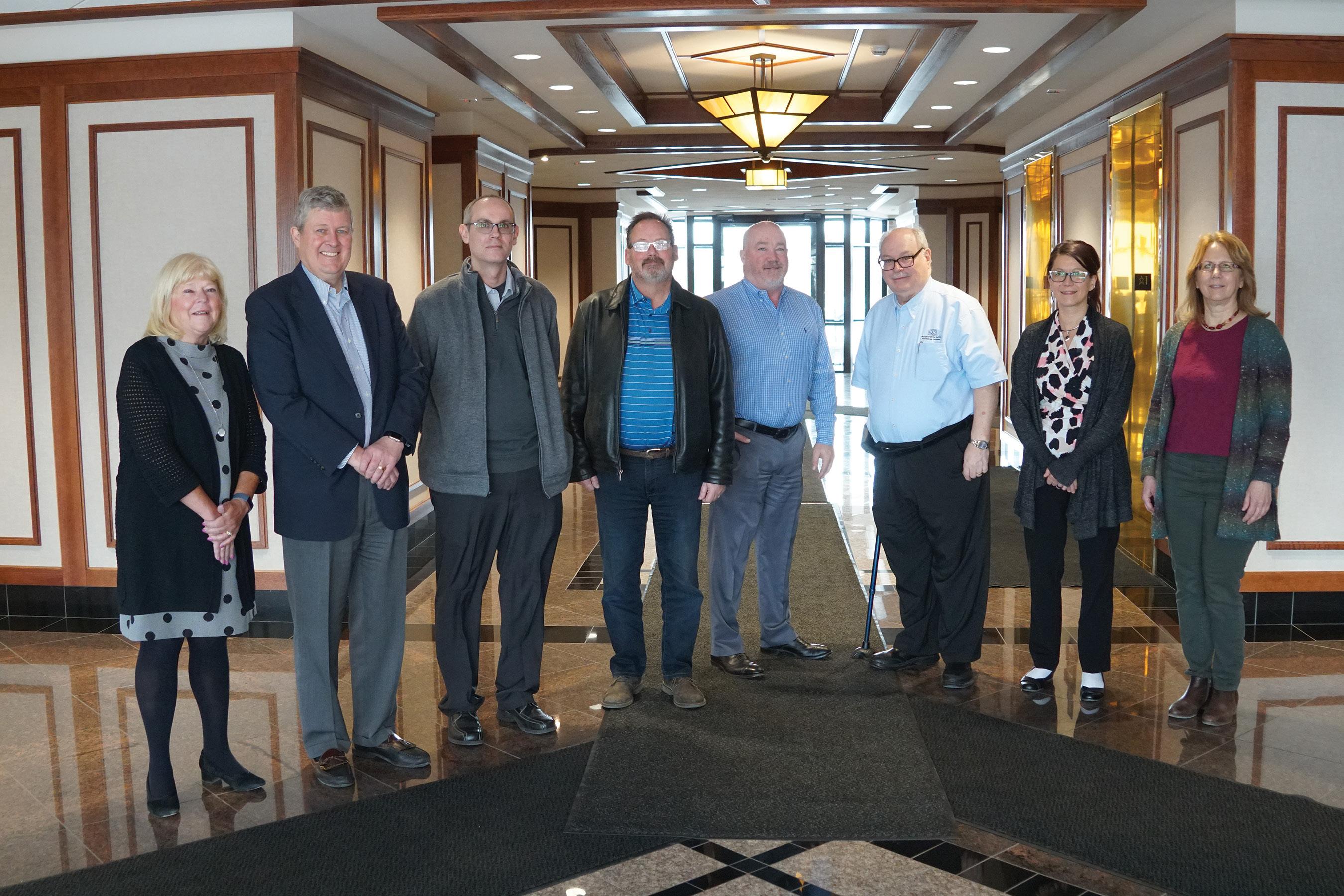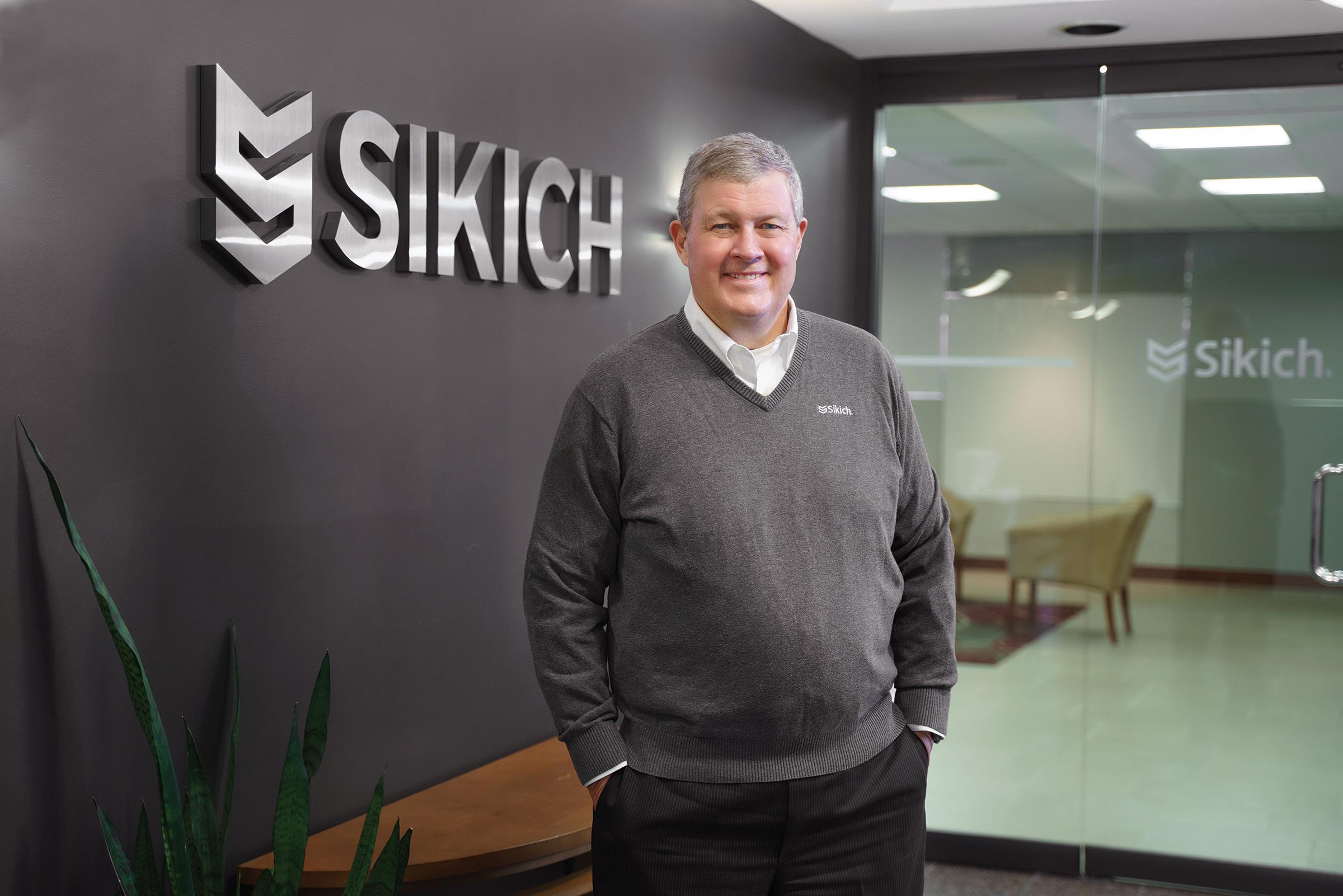
12 minute read
The tax man
By Marcia Tillett-Zinzow

Jim Brandenburg, CPA, MST, tax partner for the professional services firm Sikich LLP, is the firm’s resident tax expert. With a master’s in tax and more than 35 years’ studying corporate and partnership tax law and tax legislation, he knows his stuff. Working from Sikich’s Brookfield office, Brandenburg breaks down complex tax laws and tax law changes and translates them for his clients, his colleagues and the interested accounting and tax public, including other members of his firm. He does this through webinars and presentations; in articles posted on the firm’s website, in the WICPA’s On Balance magazine and Accounting Today; during interviews with reporters for major local and national business media outlets; and even teaching a tax class at UW–Milwaukee (UWM). “You take a topic and boil it down so it’s somewhat understandable and there’s something they can gain from it — whether it’s another practitioner, a business owner, a corporate CFO or someone in an accounting role in a company — so they can say, ‘OK, here’s what the change is, here’s how it might apply to me, and here’s what I need to know from it or how to benefit from it,’” Brandenburg said. He has been a member of the WICPA Federal Taxation Committee for about 25 years and said he has enjoyed working with that group, making connections, sharing information and finding out what others are doing — as well as taking a break from the office to come to meetings at the WICPA offices. He also pointed out the occasional participation in the committee’s meetings by former Speaker of the House Paul Ryan before he rose through the ranks on Capitol Hill. “We’d have 15 or 20 people in the meetings, so it was a pretty small group to be able to share and talk with him for an hour,” Brandenburg said. “I think he enjoyed the discussions, too. They were a little less intense than some of the politics he maybe got in Washington, just to come and sit down and talk with us. Ryan had a thorough insight on the tax law, as well as what he thought was going to happen and what changes he’d like to see happen. He also took genuine interest in our concerns as CPAs.” Ryan’s visits to the committee meetings continued when he became House Ways & Means Committee Chairman, but this ended as he spent more time in Washington, D.C., after he was selected as Speaker of the House.
Wit, wisdom and wives
In many of his communications, the tax man’s intellect is matched only by his wit. You may have heard of the “fiscal cliff” of 2012, which referred to more than $500 billion in tax increases and across-the-board spending cuts that would be effective Jan. 1, 2013, unless the president and Congress could agree on an alternative deficit-reduction deal (which they did on New Year’s Day). “We were doing an article about it near the end of the year, and it was just before Christmas, so I mentioned it was ‘the night before cliff-mas,’” explained Brandenburg. “I got a couple of strange looks when I said it, and then our marketing team said, ‘OK, we can go with that,’” and the title became “The Night Before Cliff-mas.” In similar fashion, an article a few years ago on the new opportunity zones became “Game of Zones,” which was a play on the popular HBO series “Game of Thrones.” That was Brandenburg’s suggestion, too. “I had never seen the series, but the marketing team had seen it and knew a lot about it, so they said, ‘Let’s go with that.’ They are a very talented team. We have fun trying to make tax interesting. Sometimes they say, ‘No, that’s a stretch.’ We have a few other witty folks in the office, too,” he added. One of those witty folks is Mark Miller, CPA, a tax director with Sikich and a close colleague of Brandenburg. Miller is a big reason Brandenburg is working where he is today. Back in 1992, Miller was working for the Milwaukee CPA firm of Kolb Lauwasser & Co. (later Kolb+Co., which merged with Sikich in 2013), and Brandenburg was with Ernst & Young, having started his career with Arthur Young & Co. after graduating from UW–Madison in 1981 (Arthur Young
The pandemic has given Brandenburg more time with his wife, Laurie, and grandchildren, AJ and Maya.
merged with Ernst & Whinney in 1989). Miller’s wife, Kathy, and Brandenburg’s wife, Laurie, were friends back in college at UW–Madison. They ran into each other in 1992 and talked about families, including their husbands’ work. One thing led to another, and eventually Jim joined Mark at Kolb. “It was our wives that brought it up first — and then Mark and I talked,” said Brandenburg. “I started working for Kolb Lauwasser in January 1993.”
Just-in-time education
Brandenburg’s 12-year stint with Arthur Young had been a productive one. He obtained his CPA license while working there and also earned his Master of Science in Taxation (MST). “I started out in accounting and audit and switched to tax after the first year,” said Brandenburg. “It took me three and a half years to get my master’s degree because I was working full time and attending night classes at UWM once or twice a week, as most students did. It’s only a year-and-a-half program for those who go through it full time.” He graduated with his MST in 1986, just in time to dive into one of the most comprehensive pieces of tax legislation in U.S. history: the Tax Reform Act of 1986. “There had been several changes before that — one in ’81 that President Reagan pushed through in his first term and others in ’82 and ’84. But the one in ’86 was the largest,” he said. “It brought about across-the-board change that affected individuals, businesses, international, retirement plans — and it had a significant impact to businesses. So there was much to learn and digest in order to help our clients.” Back then, neither tax practitioners nor clients had the benefit of technology to help them learn and understand the changes. Brandenburg noted the absence of personal computers and internet access, which would not become part of the standard office setup until the 1990s. So to understand the Tax Reform Act of 1986, they had to rely on written materials — which took some time for the IRS and more time for CPAs to study and absorb. “You don’t see comprehensive change like that very often,” Brandenburg noted. “The next comprehensive tax law change didn’t come for another 30 years, and that was the Tax Cuts and Jobs Act in 2017.”
Why tax?
Taxation is one of the most intricate fields of accounting, but the complexity of it is what made Brandenburg want to specialize in it in the first place. He enjoys the challenges involved in analyzing the legislative process, learning the new laws, keeping abreast of the never-ending changes and tweaks, explaining these to his clients and colleagues and working with clients to understand how the changes apply to them and what they may be able to do with them. “As difficult as it is for us practitioners to understand, it’s even more difficult for our clients. So it’s looking at how it works and how it affects their businesses and explaining what they should do with it. Sometimes you may not like the changes Congress makes, but one way or another you need to deal with these changes to help your clients,” Brandenburg said. The coronavirus pandemic blindsided everyone last year, not just tax practitioners; but they were among the hardest hit.


"The tax man" in the lobby of the Sikich office
Just as the busy tax season was clutching into fourth gear in mid-March, the pandemic T-boned it. Everyone was urged to lock down and work from home whenever possible. For tax practitioners, that meant taking a lot of work home that had been started in the office. At the same time, many clients’ businesses were being shut down. Then Congress came up with a significant tax bill that went through in a matter of days — which is very unusual for the spring of the year, according to Brandenburg — and they all had to understand and interpret it right away. “Usually tax bills go through in the summer or fall,” he said. “The last few years it’s been November and December. They [Congress] debate these issues all year long, and it seems like no progress is being made, and then it all gets pushed through in a matter of days at the end of the year. It’s not too often you get legislation during tax season.” But the economy has never been devastated during tax season — not to mention as fast as COVID-19 devastated it. To assist taxpayers and businesses and try to stimulate the economy, Congress quickly put together the $2.2 trillion economic stimulus package known as the Coronavirus Aid, Relief and Economic Security (CARES) Act. And the news that it was coming moved tax practitioners into overdrive. They were anxious about the bill being enacted so rapidly at this time of year, and they weren’t sure what it entailed and when it would apply. “We needed to know just what was going to be in there, and we needed to get that information out,” said Brandenburg. “We prioritized writing articles, pulling some webinars together and assisting clients. And there was much uncertainty in the marketplace — businesses being affected in so many ways. Everybody wanted to know how this new law would apply to them, and at the same time we were trying to finish some of these tax returns that we were normally doing then. So this all snowballed at the same time while we were still adjusting to working remotely.” In the meantime, the IRS was going through the same issues as everyone else: staff working from home, empty offices and tax returns and letters piling up in the service centers. They postponed the April 15 tax deadline to July 15, which was helpful to everyone. But the IRS had to issue millions of rebate checks in a matter of weeks, as well as deal with the new PPP loans and other incentives contained in the CARES Act. The Small Business Administration also needed to issue
guidance quickly and frequently, and they were not used to operating in this manner. Everyone was learning on the fly. “There definitely was a lot going on in the March-AprilMay time frame,” Brandenburg noted. He speaks about it in such a way that one may think he somewhat enjoyed the chaos. A tax-law hurricane like the one we’ve been through may be the stuff of a tax man’s dreams. For some, it may be just the opposite: a nightmare they hope will never come again. To still others, it’s just boring complexity. Jim and Laurie Brandenburg have three children: Matt, 31; Katie, 34; and Annie, 35, as well as two grandchildren now — AJ and Maya. He chuckles as he recalls Katie asking him at times: “I’m getting ready to go to bed, Dad,” she’d say. “Can you tell me what you did today or read me some of your tax stuff — just to help me fall asleep?”

Marcia Tillett-Zinzow is a Wisconsin freelance writer and editor. Contact her at mtzinzow@icloud.com.
The Brandenburg family
Welcome new members!
Get to know the newest members of the WICPA.

December 1, 2020 – January 31, 2021
Deanna Alexander Village of Newburg Jon E. Apelgren Packaging Corporation of America Jamie Behnke Zero Zone Inc. Mary E. Boettcher Matthew Bomkamp Johnson Block & Co. Inc. Kristi Brey Wipfli LLP Kari C. Brown Hancock & Robinson CPAs Eric Brunner Kristen Caponi RitzHolman CPAs Susan R. Connor United Performing Arts Fund Debra K. Dahlby TDS Telecom Inc. Zachary S. Decker Woita & Associates Loraine N. Erickson Joshua S. Farnam FIS Lucas Fater Johnson Block & Co. Inc. Korianne Fischer Breunig CPA LLC Kevin E. Fountain Exact Sciences Corp. Roger A. Fuller Fuller CPAs LLC Katie A. Gee Marathon Cheese Corp. Scott Glasgow Willms-O'Leary S.C. James A. Heinrich Andrea D. Heise Ethan Hoffman KerberRose S.C. Maria Kang SVA Certified Public Accountants S.C. Thomas H. Kingston MacArthur Kirksey Robert W. Baird & Co. Inc. Christopher T. Krumm Gressco Limited Nicole Kube Tammy Kuester Judy C. Kysely Christine M. Landes Christine M. Landes CPA Anne C. Larson Jennifer A. LeCaptain Lakeland University Amanda Linam SVA Certified Public Accountants S.C. Beth M. Livingston Deloitte & Touche LLP Rebecca Mayo PwC Alexander McCarville Baker Tilly LLP Nathan J. Meyer Tobin & Hanson S.C. Brenda S. Morrell Green Lake Conference Center Kathy L. Nelson Journey Mental Health Center Inc. Lori M. Nixon University of Wisconsin-River Falls Suzanne J. Ortega ABGi USA Michael E. Outcalt Kristi Parker Ruder Ware LLSC Erika Proehl PwC Kurtis W. Raddant Curative Connections Lorn Randell Uline Inc. Jane E. Reardon Charles Roedel City of Milwaukee Office of the Comptroller Nicole M. Rotier Spring Bank Kathleen A. Ruzicka K&M Tax Service Cameron Sawyer Baker Tilly LLP Jason Schmitt Jacobson & Schmitt Advisors LLC Lyndsey Streff Tushaus & Associates LLC Jessica Sura U.S. Venture Amber Tigert KerberRose S.C. Morgan Winter Cohen & Co. Mark W. Wirtz Tri City National Bank Alyssa M. Witt U.S. Venture Darlene Wood University of WisconsinMadison Medical School Panyia Yang Anna E. Zoellner
Let’s make the connection.

INTRODUCING A NEW WAY FOR WICPA MEMBERS TO COLLABORATE
WICPA Connect is your new and exclusive members-only networking and knowledge base designed to connect you with WICPA members and resources.
• Network with peers and grow your contact list using the member directory of more than 7,000 members.
• Post questions to find out from fellow members who have the expertise or may have been in the same situation.
• Personalize your profile by adding your interests, education, experience, honors and even your photo. • Contribute and download resources such as documents, whitepapers, articles, reports, guides and more.
• Share your knowledge and expertise by answering questions and offering your insights and ideas to fellow members.
• Customize your experience with controls for profile visibility, discussion signatures, notifications and more.
As a WICPA member, you already have a profile on WICPA Connect. Simply go to wicpa.org/connect and sign in using your existing website login information.

